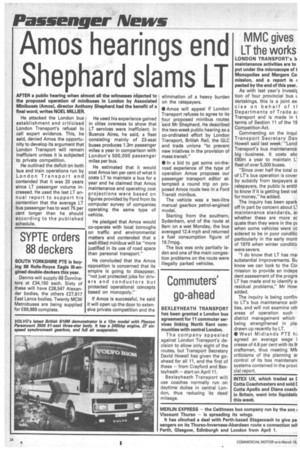Amos hearings en Shephard slams LT
Page 26

If you've noticed an error in this article please click here to report it so we can fix it.
AFTER a public hearing when almost all the witnesses Objected to the proposed operation of minibuses in London by Associated Minibuses (Amos), director Anthony Shepherd had the benefit of a final word, writes NOEL MILLIER.
He attacked the London bus establishment and criticised London Transport's refusal to call expert evidence. This, he said, denied Amos the opportunity to develop its argument that London Transport will remain inefficient unless it is subjected to private competition.
He outlined the deficit on both bus and train operations run by London Transport and contended that it was 20 years since LT passenger volume increased. He used the last LT annual report to support his contention that the average LT bus passenger has to wait 75 per cent longer than he should according to the published schedule. He used his experience gained in cities overseas to show that LT services were inefficient. In Buenos Aires, he said, a fleet consisting mainly of 23-seat buses produces 1.3m passenger miles a year in comparison with London's 500,000 passenger miles per bus.
He estimated that it would cost Amos ten per cent of what it costs LT to maintain a bus for a year and he claimed that Amos maintenance and operating cost. projections were based on figures provided by Ford from its computer survey of companies operating the same type of vehicle.
He pledged that Amos would co-operate with local boroughs on traffic and environmental matters and contended that a well-filled minibus will be "more justified in its use of road space than personal transport" He concluded that the Amos opposition is concerned that its empire is going to disappear, "not just protected jobs for drivers and conductors but protected operational concepts based on monopoly."
If Amos is successful, he said it will open up the door to extensive private competition and the
elimination of a heavy burden on the ratepayers.
• Amos will appeal if London Transport refuses to agree to its, four proposed minibus routes said Mr Shepherd. He described the two-week public hearing as a co-ordinated effort by London Transport, British Rail, the GLC and trade unions "to prevent new iniatives in the provision of mass transit."
• In a bid to get some on-theroad experience of the type of operation Amos proposes our passenger transport editor attempted a round trip on proposed Amos route two in a Ford Transit minibus.
The vehicle was a two-litre manual gearbox petrol-engined model.
Starting from the southern, Sydenharn, end of the route at 9am on a wet Monday, the bus averaged 12.4 mph and returned a fuel consumption figure of 19.7mpg.
The bus was only partially laden and one of the main congestion problems on the route were illegally parked vehicles.












































































































